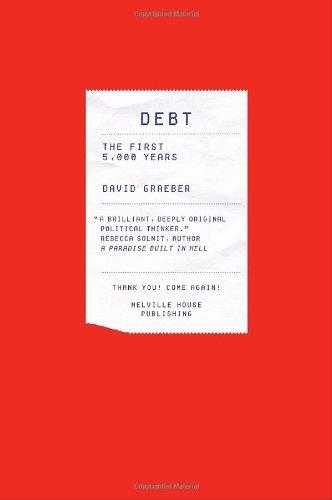m (581,2) |
|||
| Line 16: | Line 16: | ||
# Cruelty and Redemption [[580]] | # Cruelty and Redemption [[580]] | ||
# A Brief Treatise on the Moral Grounds of Economic Relations [[581]], [[582]] | # A Brief Treatise on the Moral Grounds of Economic Relations [[581]], [[582]] | ||
| − | # Games with Sex and Death [[582]] | + | # Games with Sex and Death [[582]], [[583]] |
# Honor and Degradation, or, On the Foundations of Contemporary Civilization | # Honor and Degradation, or, On the Foundations of Contemporary Civilization | ||
# Credit Versus Bullion, And the Cycles of History | # Credit Versus Bullion, And the Cycles of History | ||
Revision as of 07:23, 25 December 2011
Debt, The First 5000 Years, by David Graeber (2011)
Read by Robin Upton from episode 576, an ongoing reading List of Episodes
David Graeber takes an anthropologist's view of money and debt, looking at evidence outside the purview of economists such as vedic texts, and anthropologists accounts. This book is a slaughterhouse of economists' sacred cows.
Graeber shows, for example, that not only has there never been any evidence that money evolved from barter, but that for over a century, there has abeen a lot of evidence that it didn't. Disregarding such conventional wisdoms, he describes a very different picture of the world's economic history, one in which money and debt are not an impartial, amoral facts of ecvonomic life, but go hand in hand with state sponsored imperial violence. He mixes insights from psychology, anthropology and history to paint an unconventional but compelling picture of the impact of money, one that differs sharply from the flattering fables spun by well paid economists and economic historians. Indeed, he suggests we think hard about the very idea of considering 'the economy' to be separate from other facets of life.
Contents:
|
